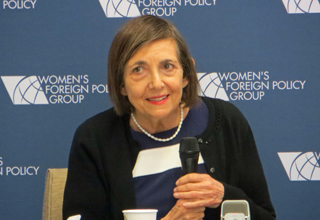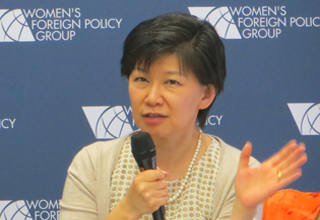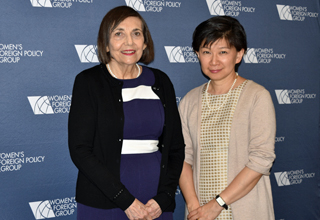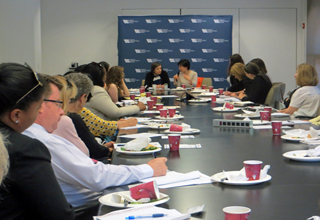The World Humanitarian Summit: Changing How We Respond to Global Crises
Izumi Nakamitsu, UN Assistant Secretary-General and
UNDP Assistant Administrator, Crisis Response Unit
Photos
Washington, DC—On June 8, 2016, United Nations Assistant Secretary-General and UNDP Assistant Administrator, Crisis Response Unit, Izumi Nakamitsu briefed the WFPG on the importance of the May 22-24 World Humanitarian Summit and its implications for the future. Nakamitsu outlined the changing nature of crises, the future of development, and concrete commitments that were made at the Summit to create sustainable change. Nakamitsu highlighted that the Summit is a success and discussed the challenges that lie ahead.
The World Humanitarian Summit was called by UN Secretary General Ban Ki-moon in response to the changing nature of humanitarian crises. As crises have become protracted—lasting for 7 years and displacing people for 17 years, on average—the previous development method of providing immediate humanitarian aid that tackles the symptom of the problem is no longer viewed as effective. Nakamitsu noted that a dependence on humanitarian handouts is detrimental to refugees’ well-being, as this reliance does not constitute a “normal life.” Nakamitsu emphasized that development and humanitarian assistance must be re-wired to tackle the root causes of conflict and the very need for humanitarian aid.
Going forward, according to the Assistant Administrator, development must focus on crisis prevention by tackling volatility, resolving prolonged conflict situations, and moving from funding to financing. While natural disasters, conflicts, and other shocks themselves cannot always be prevented, an investment in preventative risk-reduction efforts for these volatile situations can lessen the overall damage when disaster strikes. She said for every $1 that is invested in risk reduction pertaining to natural disasters, $7 is saved in the long run. However, the realization of these commitments may prove difficult, as the physical manifestations of prevention efforts are not as easily visible as the more politically appealing and “sexy” efforts such as delivering food to refugees.
Nakamitsu also discussed two commitments specifically made by UNDP at the Summit, which are to increase livelihood opportunities for affected populations and basic service delivery capacity. These programs generate emergency employment opportunities to facilitate rebuilding efforts. UNDP has also begun to test programs that integrate the host population with refugees and other populations in order to rebuild the community. By working together, these populations engage in dialogue and reconciliation, and allow individuals to create savings and invest locally. UNDP has already implemented these new approaches in Ecuador and the Democratic Republic of the Congo, respectively. Nakamitsu recognized that these programs are context-specific, but articulated that both of these development activities have also been proven effective in a variety of situations.
She also addressed the concrete commitments that were made at the World Humanitarian Summit by actors other than UNDP. Other UN organizations committed to operate under multi-year time frames and work together on planning and programming in the context of maintaining humanitarian principles. Furthermore, a Grand Bargain was agreed upon between UN organizations, non-governmental organizations, and 15 donor governments. This Grand Bargain includes a commitment to principles such as transparency, multi-year commitments, and an emphasis on investment in displaced peoples. At the Summit, The World Bank and the Islamic Development Bank agreed to focus more of their efforts on aiding displacement and to increase their investments in crisis prevention.
Nakamitsu views the World Humanitarian Summit as a success. However, given the challenges such as political will and coordinating humanitarian efforts between UN entities, non-governmental organizations, governments, and local organizations and populations, we will not be able to measure its true impact until at least a year out from the Summit. Read event blog post
 |
 |
 |
|
Moderator Patricia Ellis, WFPG President
|
|
Speaker Izumi Nakamitsu, UN Assistant Secretary-General and UNDP Assistant Administrator, Crisis Response Unit
|
|
|
 |
 |
 |
|
Patricia Ellis and Izumi Nakamitsu
|
|
Guests listen to the program
|
|
|
|
|